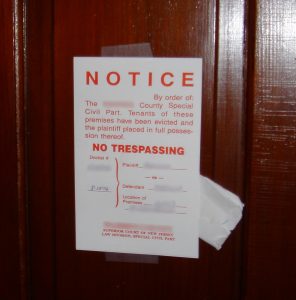Is your tenancy ending? Tips for renters in Alberta.
Do you have questions about your rights when your tenancy ends? Here is information about your rights if you have been evicted or if your lease is ending.
Are you being evicted? There are rules that landlords must follow when evicting renters.

A landlord can start the eviction process if a tenant does not follow the rules set out in the Residential Tenancies Act. For example, if a tenant does not pay rent when it is due. Depending on what the tenant has done, the landlord can file either a 14 Day or 24 Hour eviction notice.
There is a process that landlords must follow when evicting a renter. For example, a landlord cannot tell you to leave and give you three hours to pack your things.
A landlord must follow certain rules when evicting a renter – for example, the eviction notice must:
- be in writing
- include the address of the place you rented
- be signed by the landlord
- say why you are being evicted
- include the date and time your tenancy will end
It is important to know your rights if you are being evicted.
For more information about eviction, visit:
http://www.landlordandtenant.org/notices/eviction-notice/
You cannot be evicted just for filing a human rights complaint.
Did you file a human rights complaint? A landlord cannot evict you just for filing a human rights complaint. But they can evict you if you do anything that goes against the Residential Tenancies Act.
Did you receive an eviction notice after you filed a human rights complaint? Contact Service Alberta for more information about eviction. You should also contact the Alberta Human Rights Commission and let them know that the landlord is evicting you.
You cannot be locked out of your apartment while you’re still living there.
Did your landlord give you an eviction notice? A landlord cannot change the locks on your apartment if your tenancy is not yet ended. The landlord must provide you with copies of the new keys if they change the locks. The landlord has committed an offence under the Residential Tenancies Act if they lock you out before the tenancy ends. The landlord could face a fine of up to $5,000. For more information, visit: http://www.landlordandtenant.org/notices/eviction-notice/landlord-change-the-locks/
What do I do if I am locked out?
You can file a complaint with Service Alberta.
For more information, visit the Service Alberta website at:
http://www.servicealberta.ca/
A landlord can keep your security deposit, but only for certain reasons.
When you moved in, you likely gave your landlord a security deposit. A security deposit is a one-time payment that your landlord keeps until your tenancy ends.
The landlord can use the money from your security deposit when you move out, but only for certain reasons. Here are some examples:
- the tenant still owes money for rent
- the tenant caused damage to the property and the landlord completed inspection reports
- the tenant did not return the keys when they moved out
The landlord must follow certain rules if they keep your security deposit.
Does your landlord want to keep your security deposit? The landlord must follow certain rules to keep your security deposit. For example, a landlord can only keep the deposit if they have done a move-in within one week of moving in and a move-out report within one week of moving out.
Here are some of the rules that a landlord must follow when keeping your security deposit:
- The landlord must mail you a statement of account. A statement of account includes:
- the amount of the security deposit
- any interest earned
- any predicted deductions. For example, the landlord could provide estimated costs of repairs or the amount of rent that is still due.
- The statement of account must be mailed to you within 10 days of your tenancy ending.
Has it been a few weeks since you moved? Have you not received a statement of account? You should contact your landlord.For more information on getting your security deposit back, visit: http://www.landlordandtenant.org/security-deposits/.
Do you still have questions about your rights when renting? Visit: www.landlordandtenant.org.
You should not rely on this article for legal advice. It provides general information on Alberta law only.
Funding for this article was provided by the Human Rights Education and Multiculturalism Fund. 
For more information on human rights, visit: http://www.albertahumanrights.ab.ca/
Published May 2016. Copyright Legal Resource Centre of Alberta Ltd.